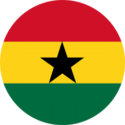Ghana
Available NAPs
Ghana: 1st NAP (Under development)
Status
An 18-member Steering Committee was set up by government to develop the NAP, led by the Offices of the Attorney General and the Ministry of Justice and the Commission on Human Rights and Administrative Justice (CHRAJ. It is a multi-stakeholder Steering Committee. It is understood that a draft has been developed and is awaiting finalisation and validation.
Process
The Ghana Institute of Management and Public Administration (GIMPA) undertook a national baseline assessment (NBA) which was launched by the Attorney General and Minister of Justice, Hon Godfred Yeboah Dame, on 4 July 2022. It is reported that at the launch, the Attorney General and Minister of Justice “charged the Steering Committee Members to come out with an action plan within 3 months to help protect human rights and businesses in Ghana.”
On 7-9 August 2022, the Commission on Human Rights and Administrative Justice (CHRAJ) and UNDP Ghana held a training workshop for the NAP Steering Committee.
DAY 2- Training Workshop for the Steering Committee to Develop a National Action Plan on Business and Human Rights in Ghana.
Ongoing Program -Business and Human Rights#humanrights #accountability #Trending pic.twitter.com/NVi85mThRF
— CHRAJGHANA ⚖️ (@CHRAJGHANA) August 9, 2022
On 28 November 2022, at the 11th UN Forum on Business and Human Rights, Ghana announced its commitment to launch a NAP by July 2023.
On 27 July 2023, the Offices of the Attorney General and the Ministry of Justice and the Commission on Human Rights and Administrative Justice (CHRAJ) organised a stakeholder consultative workshop on the development of a National Acton Plan on business and human rights in Ghana, focusing on women and persons with disability.
Transparency
The Ghanaian NBA was publicly launched by the Attorney General and Minister of Justice in an in-person event on 5 July 2022 and communicated through national news networks.
National Baseline Assessment (NBA)
• Published in July 2022 and available here.
• Developed as an independent initiative to support the development of an inaugural BHR NAP. The state is utilising the NBA to inform the development of an inaugural BHR, which is under development as of February 2023. Funded by the DIHR.
• Conducted by academics from the Ghana Institute of Management and Public Administration (GIMPA), in collaboration with the Commission on Human Rights and Administrative Justice (CHRAJ), with support from the DIHR, and OXFAM.
• Utilised the DIHR/ ICAR National Baseline Assessment Template. Based on desktop research, and interviews with, and written feedback from, key stakeholders. Primary focus was given to stakeholders in the petroleum, telecommunications, mining and finance sectors. Contains recommendations.
The NBA focused on the petroleum, telecommunications, mining and finance sectors. It analyzes Ghanaian law and international commitments in relation to UNGP standards in order to evaluate whether there are gaps in the UNGP’s implementation within the national legal framework. Furthermore, it looks at individual principles and assesses the degree of implementation within the Ghanaian context. The NBA has individual assessment chapters for principles 1-10, 26 and 27. It also takes into account secondary sources such as news reports and statements from interviewees and representatives in stakeholder roundtables.
Sorry, no Issues available.

